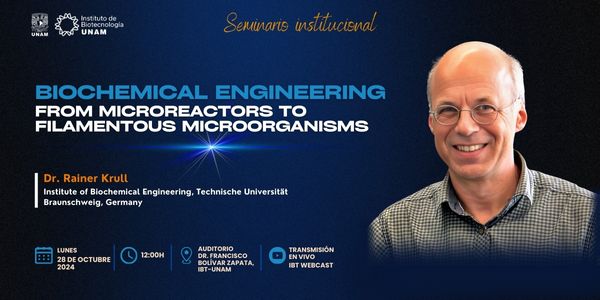
28Oct - 2024
Biochemical engineering - from microreactors to filamentous microorganisms
12:00 PM - 02:00 PM|Dr. Rainer Krull|Institute of Biochemical Engineering, Technische Universität Braunschweig, Germany|Invitado por: Dr. Carlos Peña
Seminario
With the expansion of the biotechnology and environmental technology industries, biochemical engineering emerged as an independent engineering discipline in the mid-1980s. Today, biochemical engineering plays an important role in many everyday areas. It makes an outstanding contribution, particularly in the manufacture of pharmaceutical products. It is also involved in the development of sustainable manufacturing processes based on renewable raw materials and thus makes a decisive contribution to environmental protection and resource conservation. Climate change, scarcity of resources and a growing world population have once again rapidly increased the importance and public awareness of this subject in connection with bio-based processes in recent years.
In order to be able to transfer biological and biochemical material conversion processes from the laboratory to an industrial scale and to realize them technically, biological, biotechnological and chemical knowledge is required in biochemical engineering in addition to the knowledge of classical process engineering. The subject therefore acts as a bridge between the natural sciences and engineering disciplines.
The main tasks of biochemical engineering consist of
- the quantitative detection of biotechnological processes, i.e. material conversions by biocatalysts (enzymes, cells),
- the design of suitable bioreactors and apparatuses and
- the transfer of laboratory results and theoretical concepts into practice and technical scale (scale up).
The UNAM seminar introduces the most important fundamentals and process parameters for the technical application of biotechnological processes. Methods of the biotechnological sub-areas of enzyme technology, the production of new antibiotics using filamentous microorganisms and the development of microbioreactors for biotechnological screening processes are examined and discussed using current examples.
Actualizado 2024-10-22 14:48:21
28-Octubre-2025 al 28-Octubre-2025
05:00 PM
Dra. Jeongmin Choi.
05:00 PM
Dra. Jeongmin Choi.
Arbuscular mycorrhizal symbiosis for climate resilient crop development
Auditorio Dr. Francisco G. Bolivar Zapata del IBt.
Zoom con registro.
Transmisión en vivo en el canal de la LCG en YouTube



